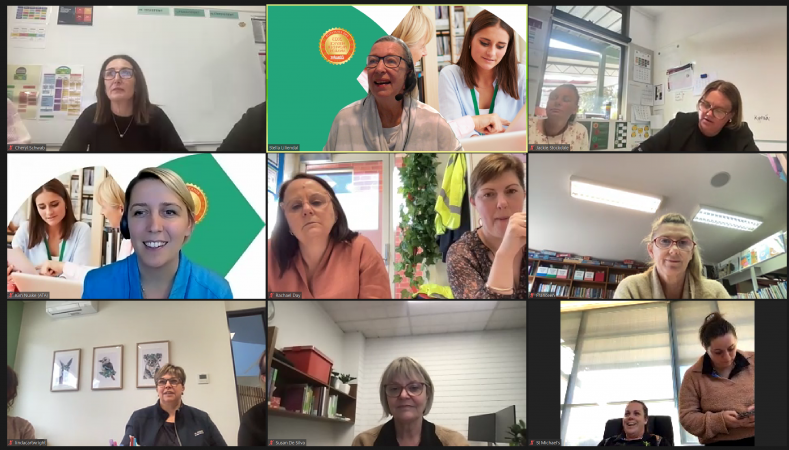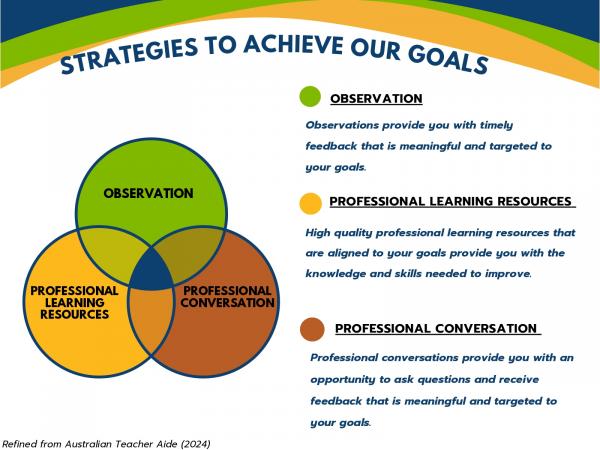Fostering a culture of continuous professional learning at Newbury Primary School
Newbury Primary School is a diverse and vibrant school in Craigieburn, Victoria, with education staff (ES) employed in a range of support roles. The school has been on a highly successful professional development journey, since becoming Australian Teacher Aide members in 2021.
A culture of professional learning
In a recent conversation, Principal Michelle Nunn shared her insights into how the school is using the Australian Teacher Aide resources to empower their ES team with continuous professional learning.
One of the key success factors identified by Michelle was the role clarity established from the school's inception. In response to a question about how the school found time for professional learning, Michelle responded:
“From the day that this school opened 7 years ago, I made it very clear that ES staff were part of our workforce. They are just like teachers, and are treated equally, and with the utmost respect. They engage in professional learning just like our teachers do. They're employed to work with teachers to support students, not to photocopy, laminate, print, or cut out resources.”

Commitment to professional learning time
Michelle highlighted that the school is committed to providing ES staff with dedicated time to engage in professional learning.
“Over the past two years, the school has provided ES staff with an hour and a half of professional learning every fortnight. During this time, they are organised into small groups, and relieved of their classroom commitments. This has been crucial in enabling staff to engage with a variety of professional development resources from the ATA website,” explained Michelle.

Facilitated small group professional learning
Staff are organised into small professional learning groups to enable them to engage in collaborative discussions, foster a sense of community and share learning experiences.
These group sessions, initially facilitated by Michelle, have progressed to a self-paced approach, tailored to the specific professional learning needs of staff.
“For example, last year, we all started with the behaviour resources because that was what staff felt they needed the most support with,” said Michelle.
This flexibility has allowed individual staff members to progress at their own pace, ensuring a thorough understanding of the content.
| Planning for professional learning The ES team moves across the school and supports a diverse range of students, and the timetabling is flexible, so staff are not working with the same students all the time. They might work with a student on the spectrum in the morning, and then with someone who's in a wheelchair later in the day, which means they are very open to learning how to support a range of students. To address this diversity, Michelle and the ES team use the PD Planner to look at the available videos and put together a professional learning plan for the year. |
Michelle tries to meet with the team at least once a term, and said they enjoy doing the professional learning. They particularly value the professional dialogue they have in small groups, as they can discuss anything that comes up, or something they have found surprising or new.
Five of the most popular professional learning resources completed by the ES team this year from the Additional Needs and Disability interest group include:
- Understanding the mental health of students with Autism
- Strategies to support students with intellectual disability
- Building school capacity to support students with hearing loss
- Modifying assessments for students with disability and additional needs, and
- Supporting students with ADHD.
Recording and acknowledging professional learning
Initially, Michelle showed staff how to use the ATA platform, including how to record completed PD in their CPD Diary to build their bank of professional learning, and how to receive certificates. This early support was crucial in setting expectations for the team.
Michelle highlighted the significance of receiving certificates of completion, as tangible recognition of the effort and dedication ES staff put into professional learning.
Advice for schools embarking on a professional learning journey
Michelle's advice to schools beginning their journey with an ATA membership is to take a strategic approach and consider what they want to achieve for their ES staff.
She emphasised the importance of dedicated time for professional learning, making ES staff feel valued and included in the broader school community.
In conclusion, Michelle's insights offer a valuable perspective on how a school's commitment, and strategic planning can create a conducive environment for continuous professional learning.
The success story of Newbury Primary School serves as an inspiration for all schools aiming to prioritise the performance and professional growth of their support staff.



